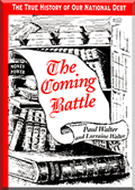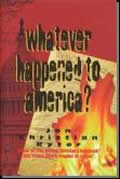Other
Ryter
Articles:
The Two Kerry's:
War Hero or
Traitor?
"Men in Black" The Cult of The Judges
THE
"FLORIDA" OF 2004
By Jon Christian Ryter
October 13, 2004
NewsWithViews.com
It appears that the State of Colorado could possibly become the "Florida" of the Election of 2004 due to Proposition 36, a measure that would amend the State's constitution by making Colorado the third State to apportion its electoral votes, giving 5 votes to the winner of the 2004 balloting while giving the loser a consolation prize of four votes�and perhaps the election.
What makes Proposition 36, also known as Amendment 36, dicey are two things. First, the measure that could amend the State Constitution was not passed by 60% of the members of the GOP-controlled State Assembly and Senate. Nor was it the result of what would be a Republican-dominated State constitutional convention. It was the result of an out-of-state, liberal, anti-Electoral College advocacy group that called itself People's Choice for President. The group initiated a petition drive in Colorado as Make Your Vote Count, and collected enough signatures to force the measure on the ballot. Second, if Amendment 36 is enacted, it contains a retroactive feature that mandates the division of electors apply to the ballots cast on Nov. 2, 2004�a clear violation of the Electoral Count Act of 1887 that was at the heart of the Florida electoral dispute in 2000 and was the basis for the U.S. Supreme Court ruling that ended the recasting of votes in Florida and placed Texas Gov. George W. Bush in the White House. It violated federal law since the Electoral Count Act of 1887 requires that the awarding of the votes be based on whatever laws were in effect at the moment the first vote is cast on election day. Since Amendment 36 will still be nothing more than an issue on the ballot when the first votes are cast, splitting electors will not be law when those votes are cast. The measure will only become law when the votes are counted�providing enough voters cast their ballots to make it law.
However, the rules that are in place when the first vote is cast in a presidential contest (according to the US Supreme Court in Bush v Gore�based on the Electoral Count Act of 1887) are the rules that will govern the entire contest during that election cycle. When the first vote is cast in the Election of 2004 in the State of Colorado, the winner of that contest will have technically been promised all nine of the State's electoral votes since that will have been the rule in effect when that vote was cast. The legal question that will be raised in a close race in which only a couple of electoral votes separate George W. Bush and John F. Kerry is whether a constitutional amendment, enacted in the closing minutes of that vote, can alter the status of the electors that existed when the first vote was cast. The legal precedent was firmly established in Bush v Gore. Should this race end up in another photo finish election, Bush v Kerry or Kerry v Bush will end up in the US Supreme Court�or, if the Kerry people have their way, in the World Court in the Hague.
In the Election of 2000, Al Gore had 268 electoral votes in hand when the Florida dispute occurred. Had Colorado been a State that apportioned its electors�even though Bush overwhelmingly won Colorado with a margin of over 143 thousand votes�Gore would have received four of Colorado's nine electoral votes�and the White House, with Florida's 25 electoral votes becoming meaningless. The final electoral vote count tally would have flip-flopped, with Gore gaining 271 votes, and Bush ending up with 267.
A completely unknown advocacy group, People's Choice for President showed up in Colorado as Make Your Vote Count after its founder, Brazilian educator J. Jorge Klor de Alvia and an unidentified secret "donor" who is trying to legalize marijuana in the United States (Czech socialist George Soros?) coughed up slightly over $1 million to finance a drive in that State to change the manner in which its electors are awarded in presidential elections. Klor de Alvia, who is purportedly now an American citizen who lives in California, is the president of a Brazilian university�Faculdare Pitagoras. He is also the president of Apollo International, Inc., a Phoenix, Arizona based global education company that is part of Apollo Group, Inc. which owns the online University of Phoenix. He is also a former instructor at Princeton University. Klor de Alvia contributed $410 thousand to steal four electoral votes from George W. Bush in Colorado. The "secret" donor who is trying to legalize marijuana in the United States contributed approximately $500 thousand. Other liberal donors coughed up the remaining $100 thousand that was used to brainwash the voters of Colorado that their votes will be lost if the electoral votes are not proportionally divided.
Colorado was specifically chosen for several reason. First, Colorado is one of only a handful of States that almost always votes Republican. The times the State has cast its electoral votes for a Democratic presidential candidate in the 20th century can be counted on one hand. (One of those times was in 1992 when Colorado gave their nine electors to Gov. Bill Clinton. In 1996, they changed their mind and gave their votes to Sen. Bob Dole.)
Colorado is "in play" this year due to the battle to gain the US Senate seat of retiring GOP senator Ben Nighthorse Campbell. The battle pits popular Democratic State Attorney General Ken Salazar against beer tycoon Pete Coors. Salazar is the odds-on favorite to win the race, with polls showing him leading Coors 51% to 49%�the same percentage that favors the passage of Amendment 36. Not even popular Republican Gov. Bill Owens has been able to stem the tide with his own voter initiative called Coloradans Against a Really Stupid Idea
But most important in the reasoning of People's Choice and Make Your Vote Count that they could win in Colorado was a 1996 change in the State's constitution that was ostensibly designed to make it more difficult to enact a constitutional amendment�by the legislature. But a Trojan Horse was inserted in the bill that would allow any citizen's group to propose an amendment to the State constitution�if they could generate a petition containing signatures of registered voters equal to 5% of whatever vote was cast for the Secretary of State of Colorado in the previous election�and have the financial means to sell their amendment to the voters through advertising and political talking heads on radio and TV who would use smoke and mirrors to convince the voters that if the electoral votes are not divided, then the votes of those who cast their ballot for the opposition no longer count.
In 1996, when the Colorado legislature changed the manner in which constitutional amendments were enacted, they were ratified by a simple majority vote. In a Republican stronghold like Colorado, that meant Republicans could amend the Constitution without too much interference from Democrats. (Republicans hold 37 seats in the State Assembly. Democrats hold 28. Eighteen State senators are Republicans and 17 are Democrats. Politically, 36% of the state's registered voters are Republicans, 30% are Democrat, and 32% are Independents who are fiscal conservatives who generally vote with the Republicans.)
The provision, added to the Constitution in 1996 read: "...Proposed amendments to the constitution may be placed on the ballot by the legislature (referendum), by citizen petition (the initiative) ...[requiring] signatures of registered voters equal to five percent of the votes cast for the office of Secretary of State at the last election, currently 54,242 signatures." The People's Choice for President petitioners collected 67,799 signatures. Twenty percent of them, according to People's Choice and Make Your Vote Count, came from registered Republicans who don't understand how the President is elected�and why.
The Trojan Horse allowed the liberals to create their own constitutional amendment�but one that would be technically unconstitutional according to Bush v Gore and the Electoral Count Act of 1887, since it would violate the rights and expectations of the candidates seeking those electoral votes at the time the balloting commenced by making the amendment retroactive. Based on Bush v Gore, the US Supreme Court ruled that presidential elections must be decided based on the rules in effect when the first vote is cast.
What gripes me about Colorado Amendment 36 is that it was not orchestrated to give a national voice to the votes of the losers in Colorado's election, nor was it placed on the ballot because of the lofty utopian aspirations of the anti-Electoral College crowd who honestly believe that the president should be elected based exclusively on the popular vote (which means the large, union-controlled northeastern and Midwestern industrial States and California will always elect the President of the United States�who will always be a liberal Democrat). The plan in Colorado was carefully devised and craftily schemed specifically to give John F. Kerry four electoral votes in the Election of 2004 he can't win any other way. If this election becomes a cliffhanger, Colorado�a State that has never been considered a battleground State�could likely decide the Election of 2004 for Kerry even though Bush will win the State's popular majority.
� 2004 Jon C. Ryter - All Rights Reserved
Sign Up For Free E-Mail Alerts
E-Mails
are used strictly for NWVs alerts, not for sale
Jon Christian Ryter is the pseudonym of a former newspaper reporter with the Parkersburg, WV Sentinel. He authored a syndicated newspaper column, Answers From The Bible, from the mid-1970s until 1985. Answers From The Bible was read weekly in many suburban markets in the United States.
Today, Jon is an advertising executive with the Washington Times. His website, www.jonchristianryter.com has helped him establish a network of mid-to senior-level Washington insiders who now provide him with a steady stream of material for use both in his books and in the investigative reports that are found on his website. E-Mail: BAFFauthor@aol.com
Colorado was specifically chosen for several reason. First, Colorado is
one of only a handful of States that almost always votes Republican.







